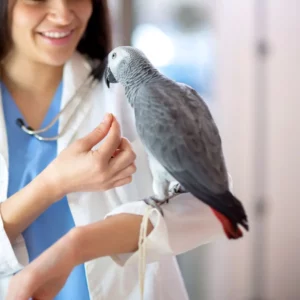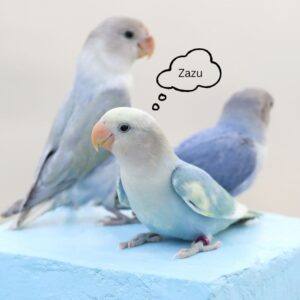While captivating with their intelligence and charm, African Gray Parrots can also be finicky eaters.
Finding reliable information about their dietary needs can be overwhelming, often leaving owners with conflicting opinions and contradictory advice.
This article aims to cut through the confusion and provide a clear, concise guide to ensuring your birdie receives the proper nutrition for optimal health and a long, happy life.
Note: These are general guidelines. We advise you to consult your bird’s healthcare provider for personalized feeding tips considering that we don’t know your bird’s origin and health state.
Table of Contents
What Do African Gray Parrots Eat In The Wild
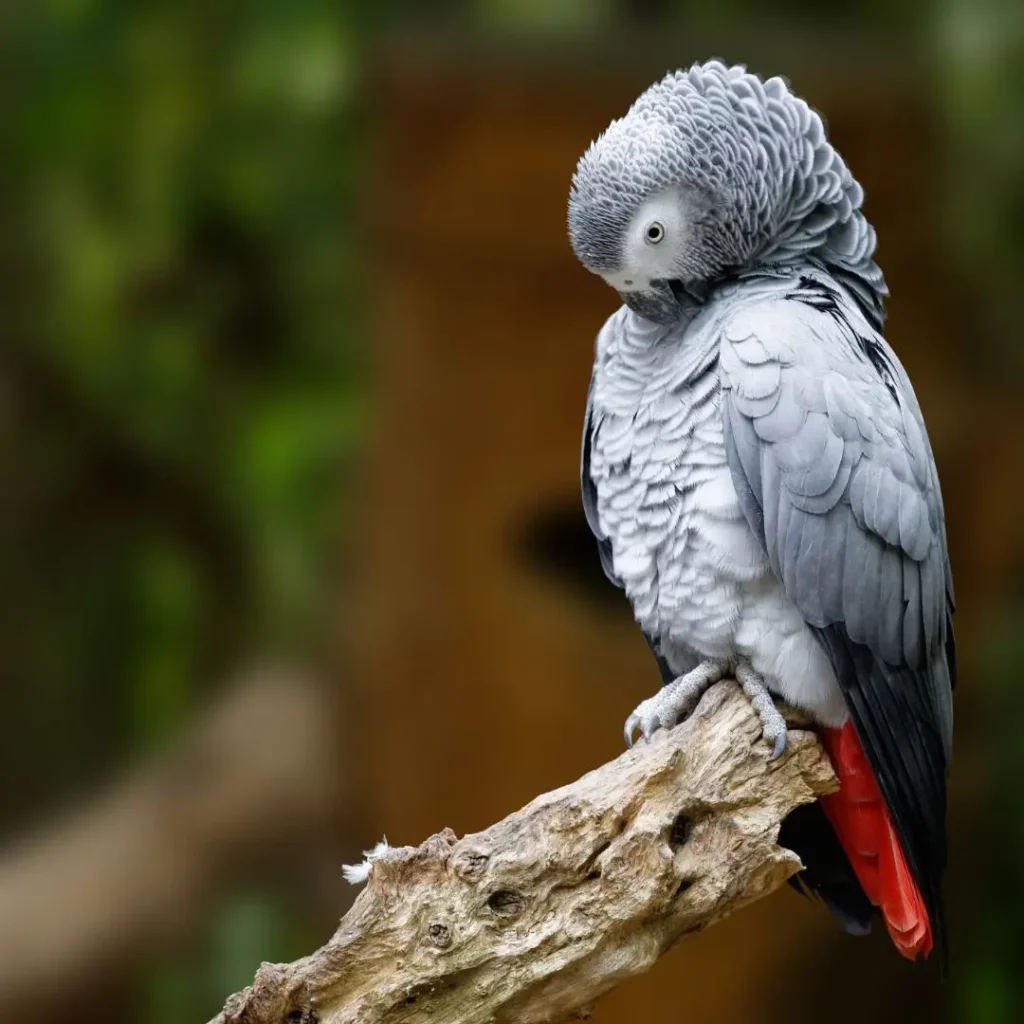
The vibrant rainforests of Central Africa provide a smorgasbord of delicious treats for the discerning palate of the African Gray Parrot. These brilliant birds are natural-born foragers, flitting through the canopy and exploring the undergrowth in search of different and nutritious food.
A significant portion of their diet consists of fruits, offering a wide range of flavors and important vitamins.
- figs,
- mangoes,
- guavas,
- and wild berries
are just a few of the common foods they eat in the wilderness. Their sharp beaks allow them to crack open tough nuts like kola nuts and palm nuts, reaping the benefits of healthy fats and protein.
Seeds are a staple food for African Grays, providing valuable energy and nutrients. They enjoy a diverse range, from the tiny grasses and legumes seeds to the larger oil palms and acacias seeds.
They also delight in the nectar and pollen of various flowers, adding sweetness and vital minerals to their meals.
African Grays are opportunistic feeders and don’t often look for protein-rich insects to include in their diet.
- grasshoppers,
- crickets,
- and caterpillars
are their most common choices, providing critical amino acids for their growth and development. They may even occasionally snack on small lizards or amphibians, fulfilling their need for calcium and other essential minerals.
Their diet changes slightly depending on the season and availability of different food sources.
During the breeding season, they may prioritize protein-rich foods to support the development of their young. Additionally, their digestive systems are uniquely adapted to handle the variety of foods they consume, allowing them to extract maximum nutrition from their meals.
What Should Your African Gray Pet Eat?
An African Grays’s health and happiness requires understanding their specific dietary needs. Unlike their wild counterparts, pet African Grays need a carefully curated diet.
Building a Balanced Foundation
High-quality pellets should form the base of your pet’s diet (around 60 – 80% depending on the personalized needs). These specially formulated pellets provide important vitamins, minerals, and amino acids for their well-being.
The key to healthy and balanced nutrition for your African Gray(s) is in variety and moderation.
Pro tip: Many brands use low-quality ingredients to make the pellets and sell them as a ‘’quality’’ product. This is why you should stick with trusted brands such as Harrison’s or Roudybush – but don’t forget to check out others you find or hear about.
Go Nuts
African Grays love nuts. This type of food can be a healthy part of your parrot’s occasional treats or a small part of their main diet plan.
A Rainbow of Freshness
Fresh fruits and vegetables should be an addition to your parrot’s diet, offering a spectrum of flavors and nutrients. Apples, bananas, berries, carrots, broccoli, and leafy greens are all excellent choices.
Veggies should make up a smaller part of your parrot’s diet. But make sure to avoid (or at least minimize) veggies like salads (icebergs, for example) – these barely contain any calories while providing minimal nutrients.
Just be sure that your bird(s) aren’t relying on fruits and veggies as a primary and only source of nutrition.
The Power of Sprouted Seeds
Sprouted seeds are a nutritional powerhouse for pet African Grays. Easier to digest and absorb than unsprouted seeds, they provide vital nutrients. Offer a small amount daily, rotating between sunflower, pumpkin, and flax types.
The right type of seeds can be a good way to enrich the already healthy diet of your African Gray parrot(s).
However, most store-bought seed mixes for pet parrots are deficient in nutrients overall. If your African Gray relies solely on these seeds, it could easily get sick – and we DO NOT want that.
The core of this problem is that birds often pick out only their favorite seeds from the mix, limiting the nutrients they get even more.
For example, they often stick only to sunflower seeds that are particularly high in fat but lack critical nutrients such as calcium and vitamin A.
Enriching Treats
Beyond the basic diet, occasional treats can add variety and stimulate your feathered friend’s interest in food. Offer them in moderation, as excessive treats can lead to weight gain and health problems.
- Hard-boiled eggs: A protein and calcium-rich treat, perfect for offering once or twice weekly.
- Bird-safe bread: Whole-wheat bread with no added sugar or preservatives can be a delightful occasional treat.
- Herbs/plants: Bird-safe herbs like parsley, basil, and mint can add variety and offer additional health benefits.
Remember: Every African Gray Parrot has unique dietary needs and preferences. Consulting with a veterinarian can be immensely helpful in creating a personalized diet that ensures your feathered friend receives the optimal nutrition for their specific needs.
Here are a few feeding tips every African Gray parent should know:
- Provide fresh water daily and change it regularly.
- Monitor your parrot’s weight and adjust their diet as needed.
- Offer a variety of food textures to promote foraging behavior.
- Always prioritize their health and well-being by providing a safe and balanced diet.
The Importance of Diversity
The diversity of their diet is critical for the health and well-being of African Grays. It ensures they receive a balanced intake of vitamins, minerals, and other important nutrients. This diversity also promotes foraging behavior, keeping them mentally stimulated and physically active.
It’s important to remember that the diet of African Grays in the wild is more complex and varied than we can fully understand or replicate in captivity.
However, by providing a diverse and balanced diet based on what we know about their natural food choices, we can give them the best possible start to a long and healthy life.
In the wild, an African Gray eats a variety of food, including:
- Fruits and vegetables
- Nuts
- Seeds
- Herbs/plants (especially African oil palm fruits)
Fruit List
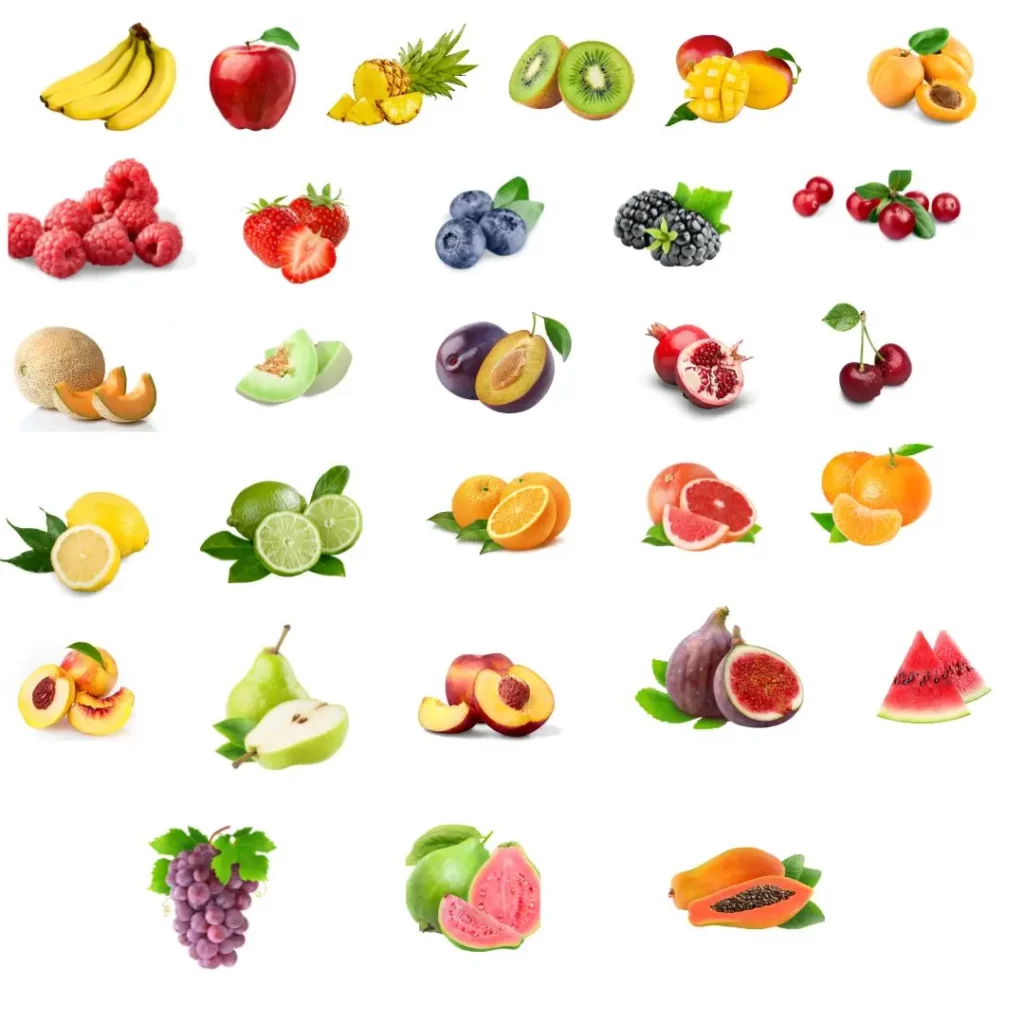
| Tropical Fruits | |
| Bananas | |
| Pineapple | |
| Kiwi | |
| Mango | |
| Papaya | |
| Berries | |
| Blueberries | |
| Strawberries | |
| Raspberries | |
| Cranberries | |
| Blackberries | |
| Melons | |
| Watermelon | |
| Cantaloupe | |
| Honeydew melon | |
| Stone Fruits | |
| Plums | |
| Pomegranate | |
| Cherries | |
| Apricots, Nectarines, Peaches | |
| Citrus | |
| Orange | |
| Grapefruits | |
| Tangerines | |
| Lemons and Limes | |
| Other Fruits | |
| Pears | |
| Raisins | |
| Apples | |
| Figs | |
| Guava | |
| Grapes |
Although fruits are one of the most common types of food that parrots eat in the wild, most fruits contain a lot of sugar for a bird’s digestive system.
But don’t be discouraged – fruits can make a delicious addition to your African Gray diet. Just ensure you’re treating this more as a small daily treat rather than a primary meal for your parro(s).
Here are some of the best fruits you should include in your African Gray’s diet:
Tropical Fruits
- Bananas: Bananas are a favorite fruit among African Gray parrots, and for good reason. Packed with potassium, vitamins B6 and C, fiber, and magnesium, bananas contribute to your parrot’s overall health.
Potassium and magnesium support heart and muscle function, and fiber improves digestion. Vitamin B6 aids in metabolism, and vitamin C boosts the immune system.
- Pineapple: Pineapple is a tropical delight that offers many important unique health benefits for African Gray parrots. This fruit is rich in vitamin C, manganese, and bromelain.
Besides the bone benefits from manganese and cell protection and immunity from vitamin C, pineapple also provides significantly better digestion with bromelain. This enzyme breaks down proteins and assists in the digestive process.
- Kiwi: Rich in vitamin C, vitamin K, fiber, and antioxidants. The unique texture and tart flavor of kiwi can add variety to your parrot’s fruit choices.
- Mango: Mango is packed with vitamins A and C. The natural sugars in mango provide a tasty energy boost for your parrot – just be sure to offer mango in moderation as a small addition to the balanced diet to prevent oversaturation with sugar.
- Papaya: Papaya is a tropical fruit that contains a lot of vitamins A and C, as well as an enzyme called papain, which improves the digestive system.
Berries
- Blueberries: Blueberries are tiny powerhouses of nutrients for our parrots. Rich in antioxidants, vitamins C and K, and fiber, blueberries offer a range of health benefits.
Antioxidants from a blueberry (flavonoids) help combat oxidative stress and protect the cells and vitamin K contributes to bone health.
- Strawberries: Strawberries bring a burst of flavor and nutrition to your African Gray parrot’s diet – they’re packed with vitamin C, manganese, and antioxidants.
Manganese is another great mineral that contributes to bone health and strength. Strawberries also have plenty of antioxidants called polyphenols, beneficial for immunity and skin health.
These antioxidants are vital in protecting your birdie’s cells and preventing potential diseases such as heart and cancer.
- Raspberries: Rich in Vitamin C, providing immune system support and aiding in collagen production. They contain manganese, important for bone health and metabolism, as well as anthocyanins, powerful antioxidants that protect cells and may reduce the risk of chronic diseases.
- Cranberries: Excellent source of Vitamin C, boosting the immune system and promoting tissue repair. They contain proanthocyanidins, which may help prevent urinary tract infections and have anti-inflammatory properties and some fiber for digestive health.
- Blackberries: Blackberries are nutrient-dense berries that offer various health benefits for African Gray parrots. Packed with vitamins C and K, fiber, and antioxidants, blackberries come with multiple health benefits.
Melons
- Watermelon: Watermelon consists mostly of water, making it one of the most hydrating fruits (food, in general) for your African Gray parrot. But it also provides vitamins A and C, contributing to eye health and immune function.
- Cantaloupe: Rich in vitamins A, C, and B6 and potassium. Boosts the immune system, aids in vision and feather health, and promotes healthy bone development and blood clotting.
- Honeydew melon: Contains vitamins A and C, as well as dietary fiber. Supports immune function, promotes healthy digestion, and aids in hydration.
Stone Fruit
- Plums: Rich in vitamins A, C, and K, help in better eye-sight, proper immunity, bone health, and blood clotting. Make sure to get rid of pits for the safety of your parrot.
- Pomegranate: is an antioxidant-rich fruit combined with vitamins C and K and antioxidants. Just be careful with seeds as they can cause choking.
- Cherries: Cherries can be a delightful addition to your African Gray parrot’s diet. But it’s critical to feed them in moderation and without pits, as this can help avoid overeating and potential choking hazards.
This fruit is rich in vitamins A and C, making it another great example of food that benefits eye health and the immune system.
- Apricots, nectarines, peaches: Rich in Beta-carotene, when converted into Vitamin A, benefits the vision, healthy skin, and feather growth. These stone fruits are high in fiber and promote digestive health and gut-bacteria balance. They’re a good source of potassium, vital for muscle function and maintaining a healthy heart.
Note: Apricots can be healthier, as they have more fiber and less sugar than nectarines and peaches.
Citrus
- Oranges: A citrusy delight that brings a burst of vitamin C to your African Gray parrot’s diet. The juicy and flavorful nature of oranges adds a refreshing element to your parrot’s food.
Watch out for small orange seeds – though you may not find them often, they’re too small for your African Gray to notice and can lead to a potential choking.
But similar to mango, they have quite some sugar (about 10 g per 100 g of oranges). So feed them to your birdie in moderation.
- Grapefruits: Rich in Vitamin C, which boosts the immune system and promotes healthy skin and feathers. Provides fiber for digestive health and gut bacteria balance. Contains antioxidants that protect cells from damage and may help prevent certain diseases.
- Tangerines: Rich in Vitamin A, important for vision. They also provide Vitamin C for immune system support and collagen production (vital for healthy skin, feathers, and beaks). The high fiber content assists in digestion processes.
- Lemons and Limes: Excellent source of Vitamin C for boosting the immune system – due to high Vitamin C complex, lemons, and lime may help fight against bacterial and viral infections due to their natural compounds. They also contain flavonoids, antioxidants that protect cells from damage.
Other Fruits
- Pears: Pears are a sweet and nutritious fruit that can be a delightful addition to your African Gray parrot’s diet. Rich in vitamins A and C, as well as dietary fiber, pears offer a solid number of health benefits.
- Raisins: Dried grapes that can serve as a tasty and energy-packed treat for your African Gray parrot. While they provide a quick energy boost, you should offer them in moderation and not too often due to their concentrated natural sugars.
Ensure you choose raisins that are free from additives like sugar or preservatives.
- Apples: Apples are a crunchy and nutritious fruit rich in vitamins A and C and dietary fiber. Don’t forget to remove the seeds and core from the apple before offering it to your parrot.
- Figs: Plenty of vital minerals, including calcium, potassium, and magnesium – calcium is beneficial for bone development and strength, potassium is vital for muscle function and maintaining a healthy heart, and magnesium helps with nerve function.
They’re a good source of natural sugars, providing energy for your parrot’s daily activities. Figs also have a decent source of vitamin K, important for blood clotting and strong, healthy bones.
- Guava: Rich in Vitamin C, supporting immune function and collagen production. Provides plenty of dietary fiber for better digestion. Also contains lycopene, an antioxidant that may help protect against cancers and heart disease.
- Grapes: Grapes are packed with vitamins C and K, antioxidants, and hydration, offering a range of health benefits. They also have a high water content, helping your parrot to stay hydrated.
Vegetable List
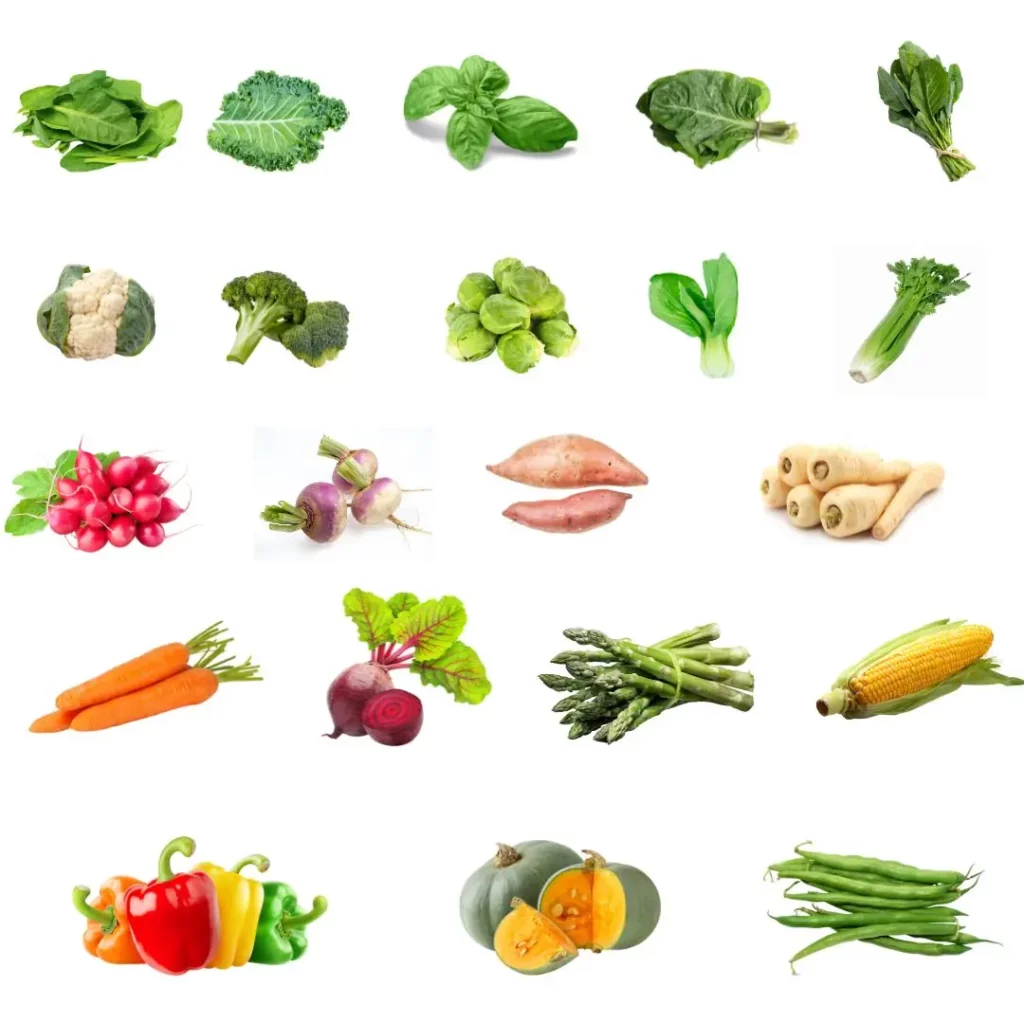
| Leafy Greens | |
| Spinach | |
| Kale | |
| Basil | |
| Swiss Chard | |
| Collard Greens | |
| Cruciferous Vegetables | |
| Broccoli | |
| Cauliflower | |
| Brussels Sprouts | |
| Bok Choy | |
| Radishes | |
| Turnips | |
| Root Vegetables | |
| Sweet Potatoes | |
| Carrots | |
| Beets | |
| Parsnips | |
| Other Vegetables | |
| Celery | |
| Asparagus | |
| Corn | |
| Bell Peppers | |
| Squash | |
| Green Beans |
Similarly to fruits, you should opt for vegetables primarily rich in vitamins A, C, K, and fiber. Here are some of the best choices you should consider:
Leafy Greens
- Spinach: A nutrient powerhouse for African Gray parrots. Packed with vitamins A, C, and K, as well as iron and calcium, spinach covers the majority of health benefits.
Iron is mandatory for proper blood circulation, as it helps create hemoglobin – a protein that helps the red cells carry enough oxygen through the bloodstream. A good source of iron often helps in preventing anemia.
Calcium is a mineral that helps in bone health, similar to vitamin K.
- Kale: Comes with folate, a type of vitamin B that supports healthy cell growth. It also has fiber, which aids in digestion, preventing constipation.
- Basil: Protects cells from damage caused by free radicals and reduces the risk of chronic diseases due to powerful antioxidants. Essential oils from basil are anti-inflammatory and antimicrobial, relieving pain and inflammation and protecting against infections.
- Swiss Chard: Has vitamin K, critical for blood clotting, preventing excessive bleeding, and promoting wound healing. It also plays a role in bone health. It’s also another good source of beta-carotene, when converted to vitamin A in the body, beneficial for vision, eye health, and healthy skin.
- Collard Greens: Folate supports healthy cell growth and feather development and plays an important role in DNA synthesis and red blood cell production. Packs plenty of vitamins C and A, excellent for bones and eye health.
Cruciferous Vegetables
- Broccoli: Minerals: Contains calcium, vital for strong bones and beak health. It’s also a good source of dietary fiber, so it helps in proper digestion. Broccoli also has sulforaphane – a potent antioxidant with cancer-fighting properties.
- Cauliflower: A nutritious vegetable that goes well with most other veggies. It has vitamins C and K, as well as fiber. Its crisp texture can give your African Gray a satisfying chewing experience – a behavior that parrots often exhibit.
- Brussels Sprouts: Brussels sprouts offer a good source of vitamins C and K, folate, and fiber. They contribute to better immunity, proper clotting, bone health, regulate metabolic processes, and maintain your parrot’s digestive health.
Brussels sprouts are also low in calories, making them an excellent choice for parrots, who can easily gain weight.
- Bok Choy: High in calcium, great for strong bones and beak health. Folate content supports healthy cell growth and feather development, promoting vibrant and strong plumage.
- Radishes: Powerful antioxidants that protect cells from damage caused by free radicals, reducing the risk of chronic heart problems. High fiber content aids digestion by promoting gut motility and preventing constipation.
- Turnips: A good source of vitamins A and K, great for eye-sight and blood clotting. They also contain plenty of omega-3 fatty acids, helping prevent inflammation and potential heart issues.
Root Vegetables
- Sweet Potatoes: Sweet potatoes are a fantastic addition to your African Gray parrot’s diet – one of the most popular choices among African Gray parents. This veggie packs plenty of beta-carotene, supporting eye health and feathers. Beta-carotene also acts as an antioxidant, contributing to overall immune system quality.
- Carrots: Carrots are loaded with beta-carotene and vitamin A, the most important nutrients in promoting eye health and aiding in clear vision. Carrots are also a good source of dietary fiber, contributing to better digestive health in your African Gray parrot(s).
- Beets: A great source of nitrates, converted to nitric oxide in the body, which relaxes blood vessels, improves blood flow, and lowers blood pressure – benefits cardiovascular health and exercise performance. Betaine in beets has anti-inflammatory properties and may help regulate homocysteine levels, reducing the risk of heart disease.
- Parsnips: Potassium from parsnips is important for muscle function and nerve health, ensuring proper nerve transmission and muscle contraction. Manganese supports enzyme function, vital for various metabolic processes in the body.
Other Vegetables
- Celery: A hydrating, low-calorie, beneficial vegetable that you don’t want to overlook in your African Gray’s diet. It’s rich in water content, vitamins, and minerals.
Vitamin K supports blood clotting (leading to faster healing processes) and strong, healthy bones. Magnesium and potassium can contribute to stronger, healthier muscles.
Its crunchy texture also aids in keeping your parrot’s beak naturally worn down. Additionally, the high water content in celery contributes to your bird’s overall hydration.
- Asparagus: Asparagus comes with plenty of vitamins A, C, and K, as well as folate, providing multiple health benefits. Folate, a natural form of vitamin B9, helps in various metabolic processes.
- Corn: Corn comes with a high content of carbohydrates, offering a good energy source. It also contains important vitamins and minerals, including vitamin B6, thiamine, and phosphorus.
- Bell Peppers (different colors offer unique benefits): Red are particularly rich in vitamin C, orange is high in beta-carotene, yellow is a good source of vitamin C and lutein (which protects against macular degeneration), and green has a high fiber content.
- Squash: Packed in vitamin A, provides and improves vision. Dietary fiber from squash promotes gut health leading to better digestion. Squash also has potassium, helping in blood regulation and muscle function.
- Green Beans: Contain iron, vital for oxygen distribution throughout the body. They also pack magnesium, which affects energy production and muscle function. Green beans are also a solid source of vitamin K, important for blood clotting and bone health.
Nut List
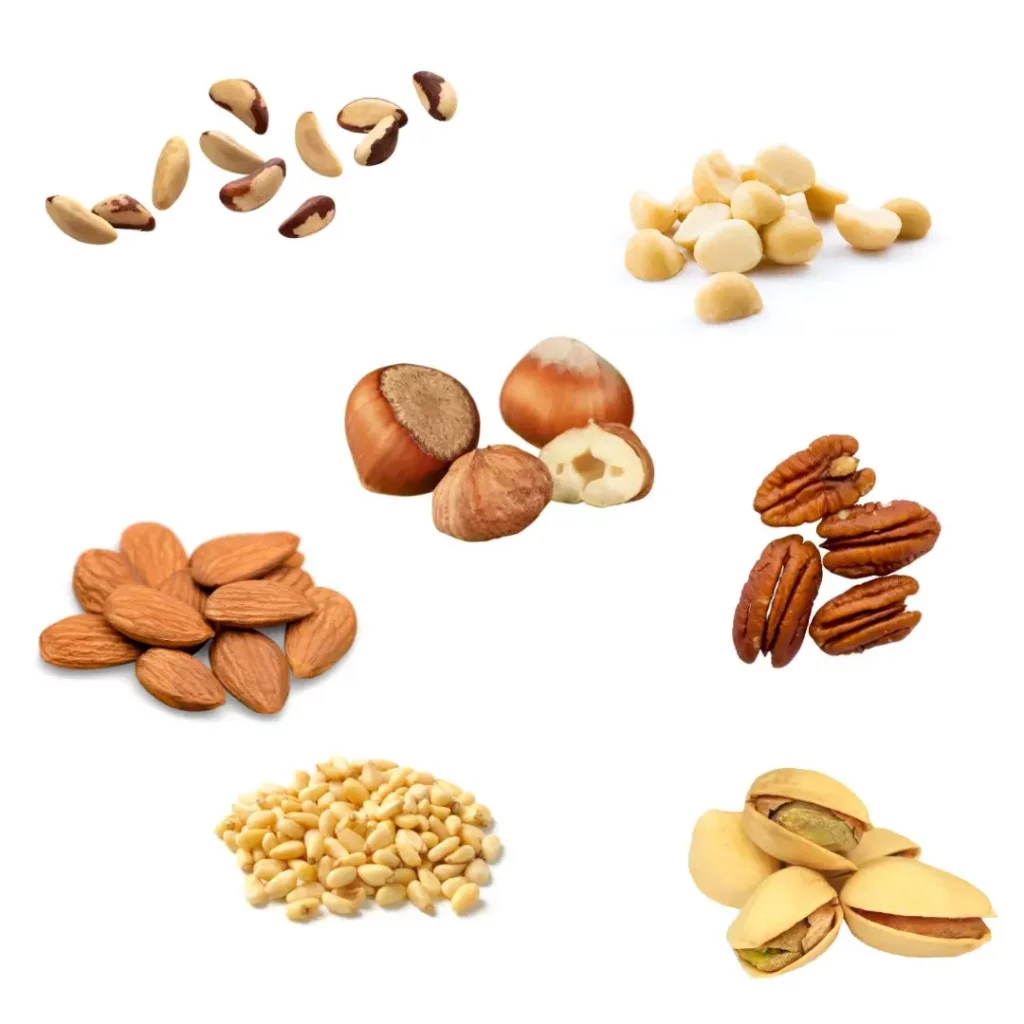
| Brazil Nuts | |
| Walnuts | |
| Almonds | |
| Pine Nuts | |
| Macadamias | |
| Pecans | |
| Hazelnuts | |
| Pistachios |
Here are some of the most beneficial nuts you should offer to your African Gray(s):
- Brazil Nuts: Brazil nuts pack a lot of selenium, these nuts support the immune system and contribute to overall feather health.
Selenium acts as an antioxidant, helping to protect cells from damage. It’s especially beneficial to younger African Grays who are experiencing growth problems.
- Walnuts: Walnuts are a powerhouse of nutrients for your African Gray parrot. These nuts are rich in omega-3 fatty acids, supporting heart health and promoting glossy feathers.
The omega-3 fatty acids can also contribute to overall brain health and cognitive function.
- Almonds: Almonds are among the most popular nuts for African Grays as they’re packed with vitamin E, which can be quite hard to get from other food.
Due to the vitamin E complex, these nuts contribute to skin and feather health in your African Gray parrot. Also, vitamin E is an antioxidant, helping protect cells from oxidative stress.
There are also plenty of healthy fats in almonds, offering a great energy source for your birdie. Just be careful with how often and how much you give them to your African Gray(s).
- Pine Nuts: Pine nuts are a great source of vital minerals like manganese, zinc, and copper. By including pine nuts in your African Gray parrot’s diet, the manganese will support their bone health, zinc will improve their immune function, and copper will keep the feathers nice and glossy.
- Macadamias: Macadamia nuts are rich in healthy fats and antioxidants. A decent amount of monounsaturated fats in macadamias support heart health but overeating them can lead to an unwanted increase in weight.
- Pecans: Another good example of a nut rich in manganese and copper. Pecans also offer healthy fats, providing a good energy source for your parrot.
- Hazelnuts: Besides minerals like manganese and calcium, these nuts represent an excellent source of vitamin E, improving the skin and feathers.
- Pistachios: Pistachios are a delicious and nutrient-dense nut. Packed with vitamins, including vitamin B6, pistachios support overall health, distribute enough energy, and help with metabolism.
Another great benefit of pistachios is that the act of cracking open pistachio shells can also provide your parrot with mental and physical stimulation – a foraging behavior that’s beneficial for developing African Gray’s intelligence.
Seed List
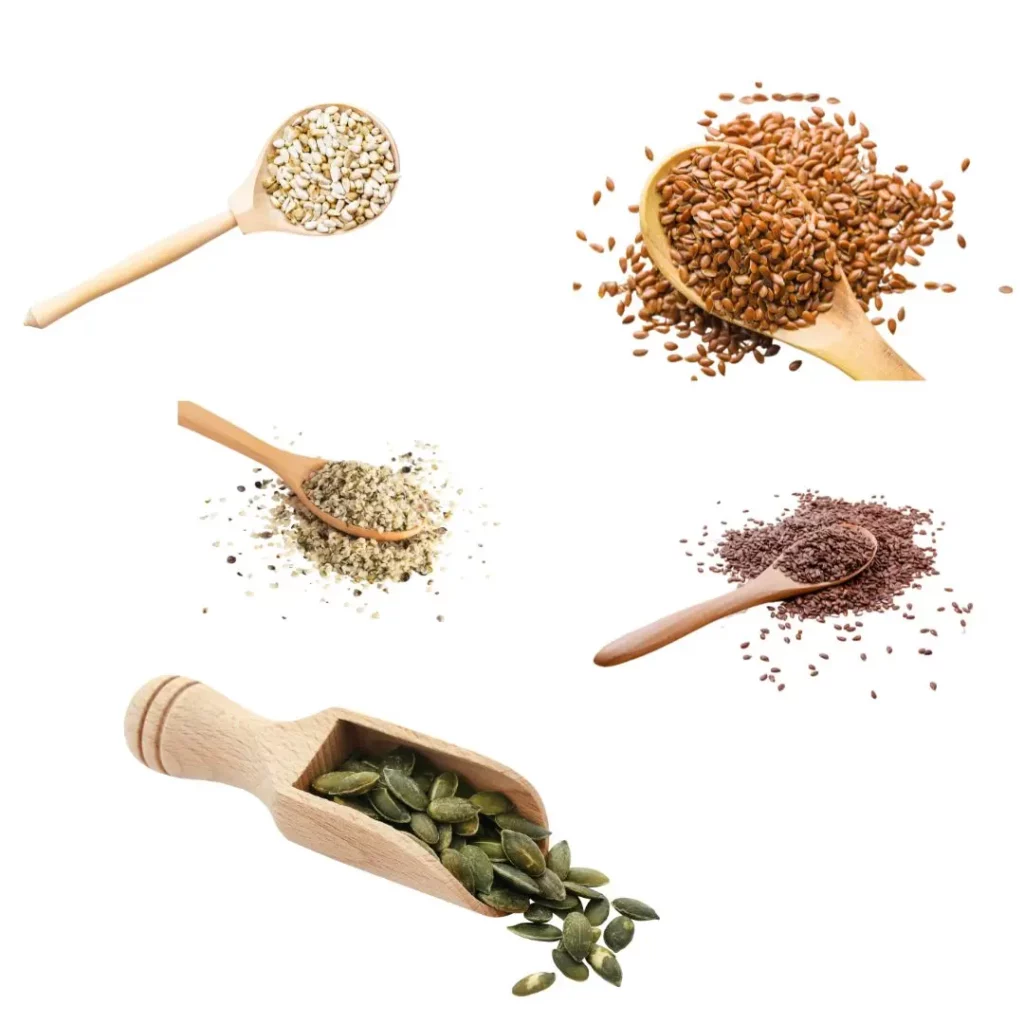
| Seeds | |
| Linseeds | |
| Sunflower seeds | |
| Hemp seeds | |
| Flaxseeds | |
| Pumpkin seeds |
Here are some valuable seeds you should consider adding to your parrot’s diet (along with other food, of course):
- Safflower seeds: Lower in fat than sunflower seeds, making them a good alternative for weight management. These seeds offer fatty acids beneficial for healthy skin, feathers, and cell function. They also provide vitamins A and B complex, improving energy metabolism, vision, and immunity.
- Linseeds: Rich in omega-3 fatty acids, which support heart health, reduce inflammation, and promote good feather condition. High in fiber, these seeds aid in digestion and promote gut health. Linseeds also contain lignans, phenolic compounds which have cancer-protective properties.
- Sunflower seeds: Excellent source of vitamin E, a powerful antioxidant that protects cells from damage and provide important minerals like manganese and selenium, vital for bone health and metabolism. While high in fat, they offer energy and calories, especially beneficial for younger and active birds.
- Hemp seeds: Rich in protein, critical for muscle growth and repair, and provide a good balance of omega-3 and omega-6 fatty acids, promoting heart health and skin health. They also contain magnesium and potassium, important for nerve and muscle function.
- Flaxseeds: Flaxseeds are an excellent source of omega-3 fatty acids, beneficial for heart health, reducing inflammation, and promoting healthy feather condition. They’re also high in fiber, which helps with digestion and promotes gut health. Just like linseeds, flaxseeds contain lignans, too, offering some cancer-protective benefits.
- Pumpkin seeds: Excellent source of zinc, vital for a healthy immune system and feather growth. Rich in antioxidants that protect cells from damage and promote overall health. Pumpkin seeds also offer magnesium and phosphorus, beneficial for bone health and energy balance.
Pellet List
| Brands to Consider | |
| Harrison’s | |
| RoudyBush | |
| ZuPreem | |
| Lafeber’s |
If you’re looking for some trusted, high-quality pellets for your African Gray(s), here are a few recommendations:
- RoudyBush Daily Maintenance Bird Food
- Harrison’s Bird Foods High Potency Coarse
- ZuPreem NutBlend Smart Pellets Bird Food
Note: Keep in mind that an African Gray could rely on pellets only but it doesn’t mean they should – so be sure to include other healthy foods as well.
List Of Foods To Avoid
- Avocado: The flesh and pit of avocados contain persin, which can be toxic to birds and cause vomiting, diarrhea, and heart damage.
- Apple seeds: Apple seeds contain small amounts of cyanide, which can harm birds in large quantities. While the apple’s flesh is safe, it’s best to remove the seeds before feeding it to your African grey.
- Unripe fruits: Unripe fruits often contain toxins that can harm birds. Make sure only to feed your African grey ripe fruits.
- Chocolate: i is toxic to birds
- Mushrooms cause stomach upset and can lead to other more serious health issues.
- Dairy products: birds can’t digest them.
- Alcohol: is toxic
- Peanuts: Peanuts are susceptible to mold growth, which can produce toxins harmful to birds. It’s crucial to ensure that any peanuts offered are fresh and mold-free.
- Sugary or salty snacks: Too much salt can increase thirst, dehydration, and excessive water consumption. A lot of sugar intake can cause increased blood pressure and heart problems over time, potentially leading to a shorter lifespan of African Grays.
The Importance of Hydration
Although an adequate food plan is critical for African Grays, we shouldn’t forget their hydration. Providing fresh, clear water to your African Gray parrot(s) is equally important.
Pro tip: Consider filtered or bottled water for better quality.
What about tea
Technically Grays can have tea. However, teas available in stores may contain caffeine.
Ideally, you would brew tea from real dried plants.
In this case, here are a few tea types African Grays could drink:
- Chamomile tea: This tea has a calming effect and is a good choice for bedtime.
- Rooibos tea: This tea is naturally caffeine-free and has a sweet taste that many birds enjoy.
- Peppermint tea: This tea can be helpful for birds with digestive issues. However, it should only be offered in small amounts and not daily.
- Herbal teas: Many herbal teas are safe for birds, but it’s important to check the ingredients carefully to ensure no harmful substances.
Health Benefits of the Right Diet and Important Guidelines
Whether you’re a potential African Gray owner or already have one (or multiple), it’s critical to understand that African Gray parrots thrive on a balanced diet – just like us.
To help you find the right choice of food for your African Gray parrot(s), here are some of the most valuable nutrients they require:
- Beta-carotene – one of the most important nutrients for your African Gray parrot(s), as it single-handily provides a lot of health benefits (improves feathers, eyes, immunity system, and even digestion)
- Vitamin B – aids in metabolism by regulating components such as protein, fat, and carbohydrate.
- Vitamin C – lowers blood pressure and boosts the immunity system.
- Vitamin K – improves bone health and helps in blood clotting (healing)
- Vitamin A – improves vision and keeps the eyes healthy.
- Fiber – aids in digestion.
- Magnesium and Potassium – improve the muscle (especially heart) function.
- Iron – improves blood circulation by aiding in hemoglobin production.
- Calcium – stronger and healthier bones.
- Antioxidants – protect the cells, potentially preventing common diseases.
- Omega-3 Fatty Acids – support heart health and strengthen feathers.
Here are some of the important guidelines you should follow:
- Wash vegetables and fruits thoroughly before offering them to your parrot.
- Avoid relying on vegetables from the nightshade family, such as tomatoes, eggplant, and potatoes, especially if they’re raw. (sweet potatoes can be an exception if prepared adequately)
- Gradually introduce new fruits and veggies to monitor for any allergies or digestive issues.
- Offer a variety of food to ensure your parrot receives a balanced diet.
- Be mindful of portion sizes, as excessive vegetable consumption can lead to weight gain and decreased pellet intake.
- Cut into tiny-sized pieces
What Should You Feed Your Baby African Gray?
One of the most critical factors determining the quality of your baby’s African Gray life is their diet plan. To help you provide your African Gray baby with the most suitable diet possible, here are some tips:
- Starting with seeds in the beginning is fine, but it’s important to gradually switch to high-quality pellets – transitioning from seeds to pellets can take weeks to months, so don’t be afraid to start early on.
- You can wean your little birdies off seeds over the first two to six weeks.
- Don’t cut seeds entirely without ensuring your bird is trying pellets, fruits, and veggies.
- If you notice your baby African Gray isn’t into pellets yet; that’s fine – you can give them a few more weeks and try again.
- Just like with adult African Grays, monitor weight on a digital scale to prevent potential overeating or unwanted weight loss.
- You can add supplements to their diet, but taking your African Gray baby to the vet and consulting first is mandatory.
- Once the diet of your birdie mostly consists of nutrient pellets, you can stop adding supplements – though, again, make sure you talk to your vet before making decisions like this.
Common Health Issues From a Poor Diet
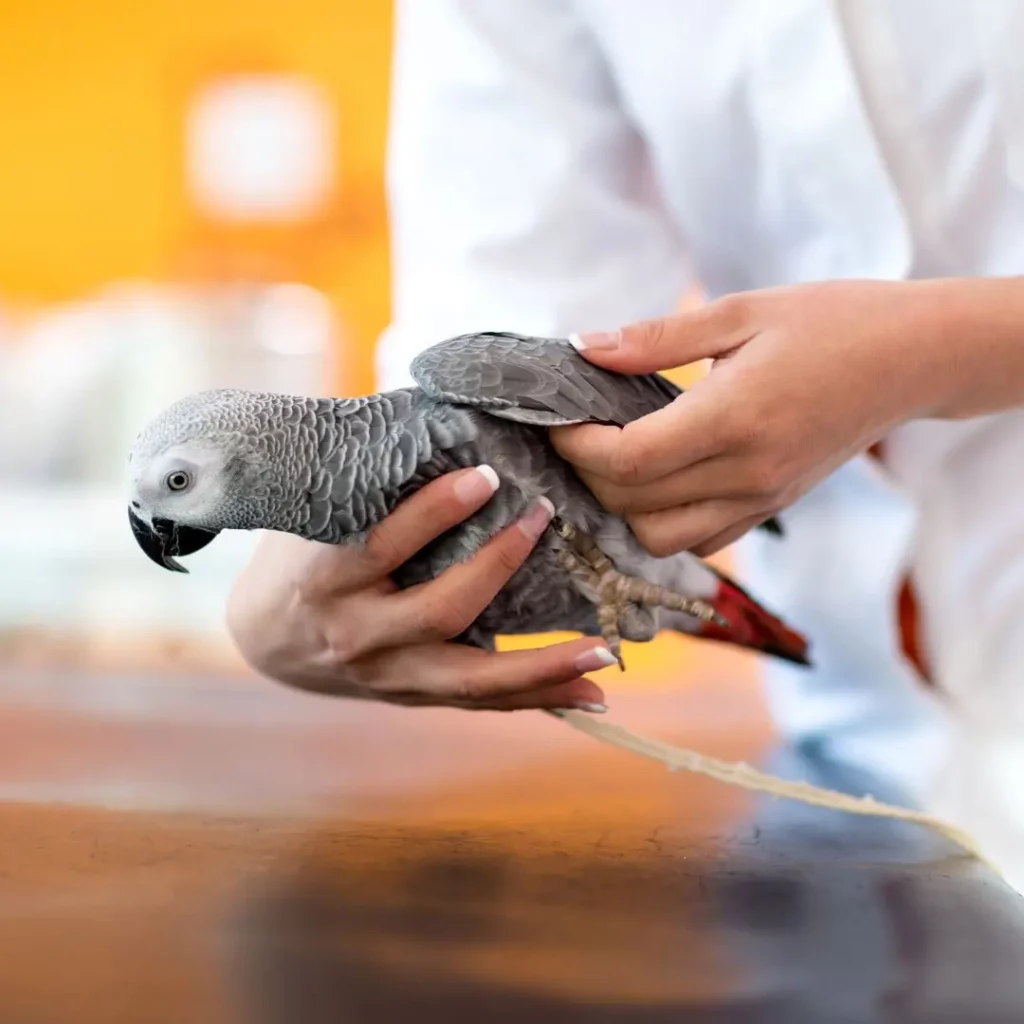
Rescue birds or birds adopted from shelters often exhibit health issues from poor nutrition. If you don’t feed your African Gray parrot(s) with a healthy and balanced diet, there are several common health problems your birdie may experience.
Vitamin A Deficiency
- Symptoms: Swollen sinuses, discharge from eyes and nose, weight loss, feather picking, lethargy
- Cause: Insufficient intake of vitamin A-rich foods like carrots, leafy greens, and mangoes
- Treatment: Dietary changes and vitamin A supplements
Calcium Deficiency
- Symptoms: Soft eggs, tremors, difficulty perching, rickets (deformation of bones)
- Cause: Lack of calcium in the diet, especially in egg-laying females
- Treatment: Calcium supplements, dietary changes
Obesity
- Symptoms: Excess fat deposits, difficulty flying, lethargy, liver disease
- Cause: Overconsumption of seeds and fatty treats, lack of exercise
- Treatment: Dietary modifications, increased exercise opportunities
Note: Keep in mind that even though this health problem may not seem that serious compared to others, excess weight can cause mobility issues, difficulties, and potential injuries for your African Gray when moving in or out of their cage.
Feather Disorders
- Symptoms: Feather loss, broken feathers, abnormal feather growth
- Cause: Nutritional deficiencies, including inadequate protein, vitamins, and minerals
- Treatment: Addressing underlying nutritional deficiencies, improving diet
Liver Disease
- Symptoms: Weight loss, lethargy, vomiting, diarrhea, jaundice
- Cause: Long-term consumption of a fatty diet, lack of essential nutrients
- Treatment: Dietary modifications, medication, supportive care
Metabolic Bone Disease (MBD)
- Symptoms: Soft bones, deformities of the beak and legs, bone fractures
- Cause: Vitamin D deficiency, calcium and phosphorus imbalances
- Treatment: Dietary changes, vitamin D supplements, calcium and phosphorus supplements
Iron Storage Disease
- Symptoms: Liver damage, anemia, weight loss, weakness
- Cause: Excessive intake of iron-rich foods like spinach and kale
- Treatment: Dietary modifications, chelation therapy
African Gray Parrot Food Recipes
Do you want to make something special for your African Gray(s) but don’t have any ideas?
Here are a few ideas for some delicious and nutritious homemade recipes you can make for your birdie(s):
Easy Veggie Chop
This chop is packed with vitamins and minerals from a variety of vegetables.
Ingredients include:
- 1/2 cup chopped carrots
- 1/2 cup chopped broccoli
- 1/4 cup chopped sweet potato
- 1/4 cup chopped bell pepper
- 1/4 cup chopped kale
- 1 tablespoon chopped peanuts
Instructions:
- Chop all vegetables and peanuts into small, bite-sized pieces.
- Mix all ingredients together in a bowl.
- Serve fresh or store in an airtight container in the refrigerator for up to a few days.
Fruity Salad
This salad combines the protein of quinoa with the sweetness of different fruits for a balanced and tasty treat.
Ingredients include:
- 1/4 cup quinoa, cooked
- 1/4 cup chopped blueberries
- 1/4 cup chopped strawberries
- 1/4 cup chopped mango
- 1 tablespoon chopped almonds
Instructions:
- Cook the quinoa according to package instructions.
- Chop all fruits and almonds into small pieces.
- Combine all ingredients in a bowl.
- Serve fresh or store in an airtight container in the refrigerator – no more than a couple of days.
Vet Q&A
What food is best for African Grey parrot?
The best food for African Gray parrots is pellet-based, meaning their diet should consist mostly of high-quality pellets with the addition of fresh veggies, fruits, nuts, and seeds.
Also, don’t forget that fluid intake is important too. So be sure to give your African Gray parrot enough water daily.
Can African Gray parrots eat bread?
Yes, African Gray parrots can eat bread. But it’s important to understand that bread isn’t a healthy food for them and shouldn’t be a primary source of nutrients for your bird(s).
Bread is a good source of carbohydrates, so if you’re African Gray lacks these nutrients or has a low-sugar diet, it’s fine to treat them with a few bite-sized pieces occasionally.
Pro tip: If you decide to share a bit of bread with your bird(s), be sure to use only a plain bread that has no extra sugar, conservatives, or other additives.
My Senior Paws is a participant in the Amazon Services LLC Associates Program, an affiliate advertising program designed to provide a means for sites to earn advertising fees by advertising and linking to Amazon.com. We also participate in other affiliate programs which compensate us for referring traffic.

